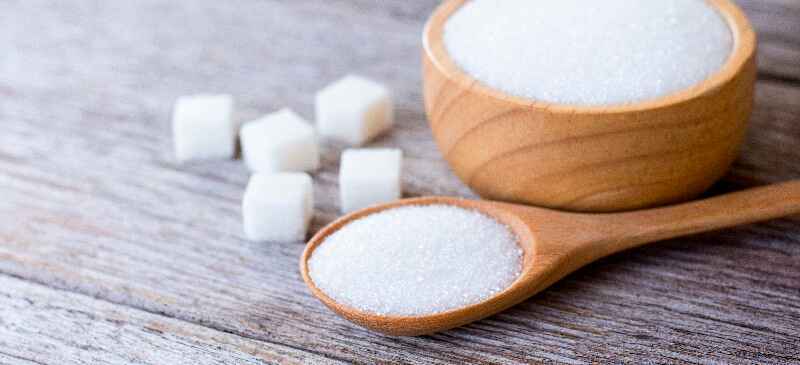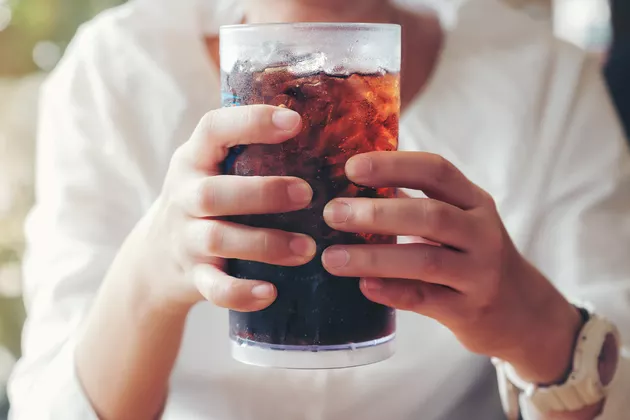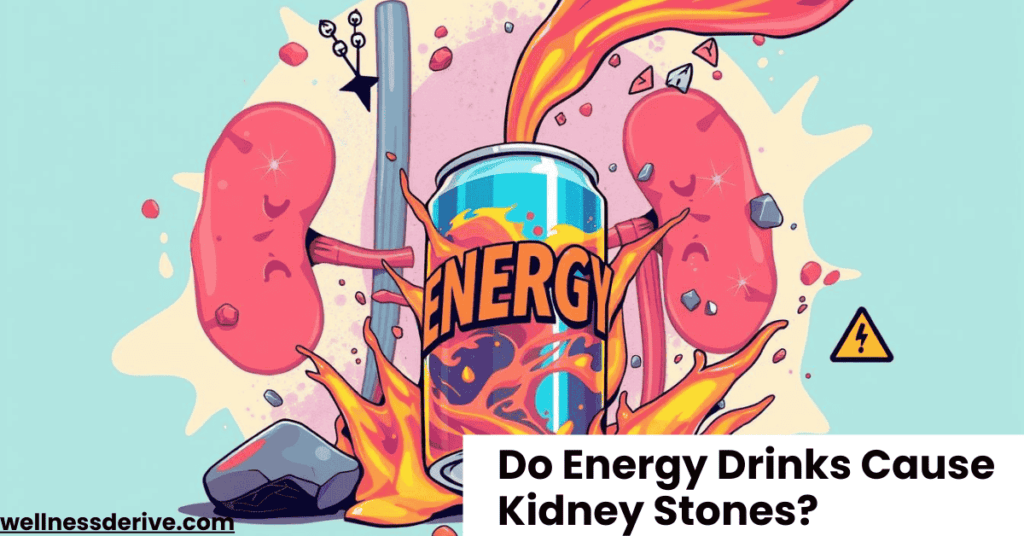Energy drinks are popular for their boost in alertness, focus, and stamina, but concerns have been raised about their potential impact on kidney health. If you’ve ever wondered, “Do energy drinks cause kidney stones?”, you’re not alone.
This article explores the connection between energy drinks and kidney stones, the ingredients that might contribute to kidney issues, and how to prevent kidney stones while consuming energy drinks.
Do Energy Drinks Cause Kidney Stones?
There is growing concern that excessive energy drink consumption may increase the risk of kidney stones. While occasional consumption is unlikely to cause harm, frequent intake of high-caffeine, high-sugar, and acidic beverages can contribute to kidney stone formation.
📌 How energy drinks may lead to kidney stones:
✔ High caffeine levels can lead to dehydration, a key risk factor for kidney stones.
✔ Excessive sugar and artificial sweeteners may contribute to calcium oxalate stones.
✔ Phosphoric acid in energy drinks can affect calcium metabolism, increasing stone risk.
✔ Increased urinary excretion of minerals may contribute to stone formation over time.
💡 Key takeaway: While not a direct cause, frequent consumption of energy drinks may increase the likelihood of kidney stones, especially in susceptible individuals.
How Do Energy Drinks Contribute to Kidney Stones?
Kidney stones develop when minerals and salts crystallize in the kidneys, forming hard deposits. The following ingredients in energy drinks may play a role in kidney stone formation:
1. High Caffeine Content Can Lead to Dehydration

Caffeine is a diuretic, meaning it increases urine output. Frequent urination without enough water intake can lead to dehydration, which is a major risk factor for kidney stones.
📌 Why dehydration increases kidney stone risk:
✔ Less water in the body means urine becomes more concentrated.
✔ Minerals like calcium, oxalates, and uric acid can crystallize and form stones.
✔ Not drinking enough water while consuming energy drinks exacerbates the issue.
💡 Solution: If you drink energy drinks, increase your water intake to maintain hydration.
2. Excess Sugar and Artificial Sweeteners May Contribute to Stones

Many energy drinks contain high amounts of sugar and artificial sweeteners, which can affect kidney health.
📌 How sugar affects kidney stone risk:
✔ Increases calcium excretion in urine, contributing to calcium oxalate stone formation.
✔ Artificial sweeteners like aspartame and sucralose may stress the kidneys.
✔ High sugar intake can lead to insulin resistance, which may increase stone risk.
💡 Solution: Choose sugar-free or low-sugar energy drinks and monitor artificial sweetener intake.
3. Phosphoric Acid Can Affect Calcium Metabolism

Phosphoric acid, commonly found in carbonated energy drinks, can impact calcium levels in the kidneys.
📌 How phosphoric acid contributes to kidney stones:
✔ Binds with calcium in the urine, forming calcium phosphate stones.
✔ May alter pH levels in the kidneys, increasing the risk of stone formation.
✔ Found in cola-based energy drinks and some carbonated beverages.
💡 Solution: Limit consumption of phosphoric acid-rich drinks and opt for non-carbonated alternatives.
4. Energy Drinks May Increase Urinary Oxalates
Oxalates are naturally occurring compounds found in many foods and beverages. When oxalate levels are high, they can bind with calcium in urine, leading to calcium oxalate stones—the most common type of kidney stones.
📌 How energy drinks may contribute to oxalate formation:
✔ Some contain oxalate-rich ingredients, increasing kidney stone risk.
✔ Caffeine and certain additives can increase oxalate excretion.
💡 Solution: If you’re prone to kidney stones, reduce oxalate intake by avoiding high-oxalate foods like spinach, nuts, and chocolate along with energy drinks.
Which Energy Drinks Are Most Likely to Cause Kidney Stones?
Certain energy drink brands contain high levels of caffeine, sugar, and additives that may contribute to kidney stone formation.
📌 Energy drinks that may increase kidney stone risk:
✔ Red Bull – High in sugar and caffeine.
✔ Monster Energy – Contains phosphoric acid and high caffeine levels.
✔ Celsius – Marketed as healthy but contains stimulants that may stress the kidneys.
✔ Bang Energy – High in caffeine and artificial sweeteners.
✔ Reign Energy – Extremely high caffeine content may cause dehydration.
💡 Solution: If you regularly consume energy drinks, opt for low-sugar, low-caffeine options and increase your water intake.
How to Prevent Kidney Stones While Drinking Energy Drinks
If you enjoy energy drinks but want to reduce kidney stone risk, follow these simple tips:
✅ 1. Stay Hydrated
✔ Drink at least 8–10 glasses of water daily.
✔ Increase water intake if consuming energy drinks.
✅ 2. Limit Sugar and Artificial Sweeteners
✔ Choose sugar-free or low-sugar energy drinks.
✔ Avoid excessive consumption of artificial sweeteners.
✅ 3. Monitor Caffeine Intake
✔ Keep caffeine intake below 400mg per day to avoid dehydration.
✔ Avoid drinking multiple energy drinks in one sitting.
✅ 4. Reduce High-Oxalate Foods
✔ If you’re prone to kidney stones, reduce oxalate-rich foods like spinach, nuts, and chocolate.
✅ 5. Balance Your Diet with Kidney-Friendly Foods
✔ Eat more fruits, vegetables, and whole grains.
✔ Increase calcium intake from healthy sources like dairy, almonds, or fortified foods.
Can Energy Drinks Cause Permanent Kidney Damage?
While occasional consumption of energy drinks is unlikely to cause permanent damage, long-term excessive intake can lead to:
✔ Chronic dehydration, straining kidney function.
✔ Increased risk of kidney disease, especially in those with preexisting conditions.
✔ Calcium imbalances, contributing to recurrent kidney stones.
💡 Solution: If you experience frequent kidney stones or kidney pain, consider reducing or eliminating energy drinks from your diet.
Final Thoughts
So, do energy drinks cause kidney stones? While they don’t directly cause them, frequent consumption of caffeine, sugar, phosphoric acid, and artificial additives may increase the risk.
💡 Key Takeaways:
✔ Caffeine can lead to dehydration, which increases kidney stone risk.
✔ Sugar and artificial sweeteners contribute to calcium oxalate stones.
✔ Phosphoric acid in carbonated drinks may affect calcium metabolism.
✔ Limiting intake, staying hydrated, and monitoring diet can help prevent kidney stones.
If you’re prone to kidney stones, consider cutting back on energy drinks and replacing them with healthier hydration options.
FAQs: Energy Drinks and Kidney Stones
Disclaimer: The content on Wellness Derive is for informational purposes only and not a substitute for professional medical advice, diagnosis, or treatment. Always consult a healthcare provider for medical concerns.


